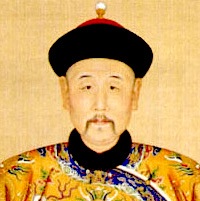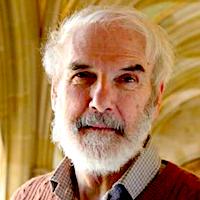

Tao Te Ching

Kāngxī 康熙帝
1654 – 1722 CE
Longest-ruling Chinese emperor, consolidator of the Qing dynasty during the transition from the Ming, first Chinese emperor to play a western musical instrument, inventor of a Chinese calendar, and supporter of bringing Western technology into China; Kangxi administered the normal political and social emperor activities engaging in war, law, economics and having 56 children; but also, he thought deeply about life and realization. A skilled politician who could combine power, flexibility and tact with his Taoist/Buddhist tradition; he traveled extensively, rarely stopped talking communicating and listening to people everywhere, and brought an exceptional openness to his autobiography exposing his faults, uncertainties, and disillusionments as well as his accomplishments and insights.
Lineages
Politicians Taoist
Eras
Chinese
Qing dynasty (1644 – 1912 CE)Sources
Emperor of China, Self-Portrait of K'ang-hsi
Unlisted Sources
Quotes by Kāngxī (16 quotes)
“I have enjoyed the veneration of my country and the riches of the world; there is no object I do not have, nothing I have not experienced. But now that I have reached old age, I cannot rest easy for a moment. Therefore, I regard the whole country as a worn-out sandal, and all riches as mud and sand.”
from Emperor of China, Self-Portrait of K'ang-hsi
Comments: Click to comment
“Arrogance means that one knows how to press forward but not how to draw back… knows something about winning but nothing about losing.”
from Emperor of China, Self-Portrait of K'ang-hsi
Comments: Click to comment
“Drinking and gambling are curses that lessen any man’s mind and strength and waste his substance.”
from Emperor of China, Self-Portrait of K'ang-hsi
Comments: Click to comment
“Ask questions about everything and investigate everything; things will start to go well when you are no longer fooled by books.”
from Emperor of China, Self-Portrait of K'ang-hsi
Chapters:
48. Unlearning
Comments: Click to comment
“As Lao-tzu says: ‘Know your limits and you’ll suffer no disgrace, know when to stop and you’ll be in no danger.’ Let no man take too much.”
from Emperor of China, Self-Portrait of K'ang-hsi
Chapters:
46. Enough
Comments: Click to comment
“Think of the profit of all as being the real profit and the mind of the whole country as being the real mind.”
from Emperor of China, Self-Portrait of K'ang-hsi
Chapters:
77. Stringing a Bow
Comments: Click to comment
“Good artisans concentrating on one specialty, refuse to dissipate their mental energy. This gives strength to their bodies and they often live to be 70 or 80, healthy and skillful as in their youth”
from Emperor of China, Self-Portrait of K'ang-hsi
Comments: Click to comment
“the crudest or simplest people have something of value to say, something one can check through to the source and remember”
from Emperor of China, Self-Portrait of K'ang-hsi
Comments: Click to comment
“When you are young your mind is sharp and penetrating—after you grow up the thoughts scatter and gallop away [...] things you studied as a child are the light of the rising sun; the studies in your maturity a candle.”
from Emperor of China, Self-Portrait of K'ang-hsi
Comments: Click to comment
“This [evil practice] is one of the worst habits of great officials, that if they are not recommending their teachers or their friends for high office then they recommend their relations.”
from Emperor of China, Self-Portrait of K'ang-hsi
Comments: Click to comment
“Careless handling of one item might bring harm to the whole world, a moment's carelessness damage all future generations.”
from Emperor of China, Self-Portrait of K'ang-hsi
Comments: Click to comment
“When I was a child, everyone praised my archery except for one old teacher; he said I was not good, and it was because of him, the critical one, that I now shoot and ride so well.”
from Emperor of China, Self-Portrait of K'ang-hsi
Comments: Click to comment
“There are too many men who claim to be pure scholars and yet are stupid and arrogant; we'd be better off with less talk of moral principle and more practice of it.”
from Emperor of China, Self-Portrait of K'ang-hsi
Comments: Click to comment
“I have never tired of the Book of Changes and have used it as a source of moral principles; the only thing you must not do is to make this book appear simple for there are meanings here that lie beyond words.”
from Emperor of China, Self-Portrait of K'ang-hsi
Comments: Click to comment
“There is no place for rulers to rest, and no resting place to which they can retreat… I tried to emulate the wise rulers of the Three Dynasties, and desired to bring lasting peace to the whole earth, and make all men happy in their work. For decades I have exhausted all my strength, day after day working with unceasing diligence and intense watchfulness, never resting, never idle.”
from Emperor of China, Self-Portrait of K'ang-hsi
Comments: Click to comment
“Make a practice of quietness and so lengthen the days of your life… If one an get even two or three hours of quiet relaxation, it makes up for days of hardship.”
from Emperor of China, Self-Portrait of K'ang-hsi
Comments: Click to comment
Quotes about Kāngxī (2 quotes)

“Kangxi had originally represented himself as a man in pain and a man with doubts [but in the] valedictory edict he emerges only as a shadow, his platitudes enshrined and his forcefulness and anger and honesty and pain all—alike—removed.”
Comments: Click to comment

“Kangxi gave China the most prosperous, peaceful, and enlightened reign in the nation's history.”
Comments: Click to comment
Comments (0)